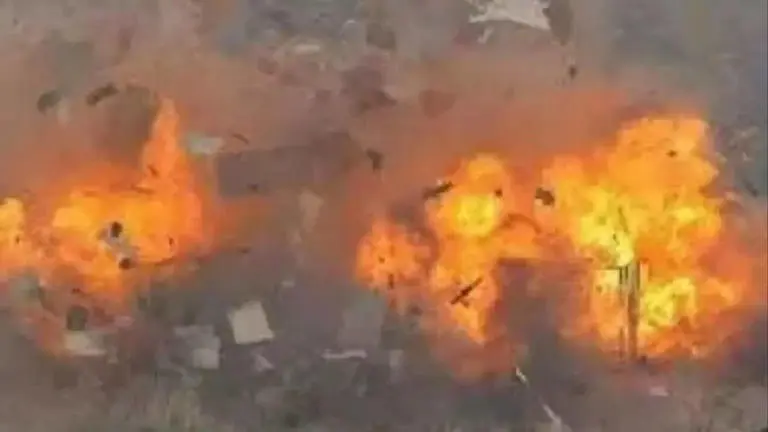
A devastating suicide bombing in Pakistan’s North Waziristan has killed 16 soldiers and injured dozens
A Morning of Bloodshed: Suicide Bomber Targets Military Convoy
On a grim Saturday morning in Pakistan’s volatile North Waziristan district, a suicide bomber from the Hafiz Gul Bahadur faction of the Pakistani Taliban drove an explosive-laden vehicle into a military convoy, killing 16 soldiers and injuring at least 29 others, including 10 army personnel and 19 civilians. The blast, which occurred in the Khaddi area of Khyber Pakhtunkhwa, was so powerful that it collapsed the roofs of nearby homes, injuring six children.
Eyewitnesses described the explosion as deafening, with smoke billowing across the village and debris scattered across the road. “It felt like an earthquake,” said a local resident. “The ground shook, and then we saw flames and heard screams.”
The attack is one of the deadliest single-day assaults on Pakistani security forces in recent months and highlights the resurgence of militant activity in the tribal belt bordering Afghanistan. The Pakistani Taliban, also known as Tehrik-i-Taliban Pakistan (TTP), has intensified its operations since the Taliban’s return to power in Kabul in 2021, exploiting the porous border and political instability in the region.
The Hafiz Gul Bahadur Group: A Dormant Threat Reawakens
The Hafiz Gul Bahadur group, once considered dormant, has re-emerged as a potent threat. This faction, which previously maintained informal truces with the Pakistani military, has now claimed responsibility for multiple attacks in Khyber Pakhtunkhwa in recent months. Saturday’s bombing marks a strategic escalation, targeting a Mine-Resistant Ambush Protected (MRAP) vehicle belonging to the Bomb Disposal Unit, a clear indication of the group’s tactical planning and access to intelligence.
Security analysts believe the group has regrouped and reorganized, leveraging safe havens across the Afghan border. Islamabad has repeatedly accused the Taliban regime in Kabul of harboring militants—a charge the Taliban denies. However, the frequency and sophistication of recent attacks suggest a coordinated insurgency that Pakistan’s current counter-terrorism framework is struggling to contain.
Since January 2025, over 290 people, mostly security personnel, have been killed in militant attacks across Khyber Pakhtunkhwa and Balochistan, according to official tallies. The TTP’s “spring campaign”, announced earlier this year, promised a wave of ambushes, suicide bombings, and targeted killings, a grim prophecy that is now unfolding with deadly precision.
A Nation on Edge: Strategic Fallout and the Road Ahead
The suicide bombing has triggered nationwide outrage and mourning, with Prime Minister Shehbaz Sharif condemning the attack and vowing a “relentless pursuit of those responsible.” The Inter-Services Public Relations (ISPR), Pakistan’s military media wing, issued a statement reaffirming the army’s commitment to eradicating terrorism, stating that “such cowardly acts cannot weaken the resolve of our forces.”
Yet, beyond the rhetoric lies a deepening crisis. The fragile security architecture in Pakistan’s tribal regions is under siege, and the civilian-military coordination required to counter this threat appears fractured. Intelligence lapses, inadequate surveillance, and a lack of community engagement have allowed militant groups to rebuild networks and recruit operatives.
The collateral damage injured children, destroyed homes, and traumatized communities, adds a humanitarian dimension to the crisis. Residents of North Waziristan, already weary from years of conflict, now face renewed displacement and fear. “We thought the worst was behind us,” said a local schoolteacher. “But now, it feels like we’re back in the dark days.”
To move forward, Pakistan must:
- Enhance border security with Afghanistan through surveillance and fencing
- Invest in counter-radicalization programs targeting vulnerable youth
- Strengthen intelligence-sharing between military and civilian agencies
- Engage tribal communities as partners in peacebuilding
- Reassess foreign policy to address cross-border militancy diplomatically
Conclusion:
The North Waziristan suicide bombing is not just a tragic loss of life, it is a strategic wake-up call. As Pakistan grapples with a resurgent insurgency, the need for a cohesive, forward-looking counter-terrorism strategy has never been more urgent. The sacrifices of the 16 fallen soldiers must not be in vain. Their deaths demand not just justice, but a renewed national resolve to confront and dismantle the forces of extremism that continue to haunt the country’s future.
Stay updated with the latest news on Rapido Updates. Keep yourself updated with The World, India News, Entertainment, Market, Automobile, Gadgets, Sports, and many more
1 thought on “Carnage in North Waziristan: Suicide Bomber Kills 16 Soldiers, Exposes Fragile Security in Pakistan’s Borderlands”